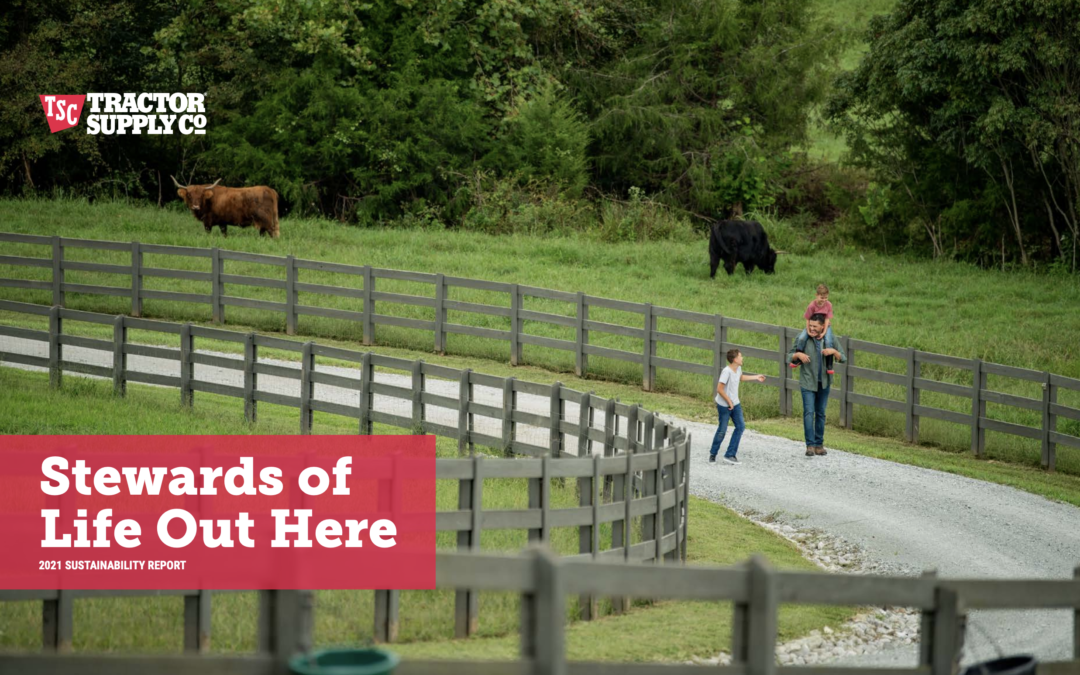Our vision for the world starts with being good stewards of the land.
It’s a common belief of Tractor Supply and our customers that we need to be good stewards of the land and our natural resources so that future generations can enjoy Life Out Here. This desire to protect our natural resources for our children and grandchildren is what drives Tractor Supply to enable our customers to live sustainably in the communities that we serve.
Tractor Supply announced a new water reduction goal to conserve 25 million gallons by 2025.
Water
Over the past few years, we have expanded customer offerings to include self-serve pet washing stations at Tractor Supply stores, grooming services at Petsense stores and Garden Centers at a limited number of Tractor Supply stores. To help manage the resulting increased demand for water, we engage in several companywide initiatives to reduce our water usage, including the use of low-flow devices, which require 25% less water than regular flow fixtures. When we identify high-usage stores via our bill pay platform, we work with the store to identify the source of the high-water use and work to remediate the situation. Implementing more timely feedback to stores has resulted in a reduction in water waste.
In areas of high or extremely high-water stress such as Arizona and New Mexico, we are working with the local water utility to establish baselines and further our efforts to use water efficiently and responsibly.
Waste and Recycling
At Tractor Supply, we know that we must be good stewards of the land and of our natural resources so that our children and future generations will have the same opportunities we enjoy today. Our sustainability program is built on a foundation of compliance with environmental laws and regulations that are monitored under our Environmental Management Program. We know a sustainable future is about thinking beyond compliance. That’s why we’re always looking for ways to become more efficient, eliminate waste, reduce our impact on the environment, and also provide our customers with easy ways to reduce their environmental impact. The following waste and recycling data applies to our store footprint only.
Solid Waste: Solid waste is produced as part of our normal business operations. We work with a third-party for most disposal and recycling efforts, ensuring the provider adheres to all regulations and the highest standards for all disposal and recycling. We continue to evaluate waste data capture and engage with our solid waste service providers to understand opportunities to increase diversion rates.
Hazardous Waste: Tractor Supply sells a wide variety of consumer products. Some of the products we sell, when returned by customers or accidently spilled, may become hazardous waste. We developed a hazardous waste management program to ensure unsalable products are properly managed and disposed of in accordance with federal and state regulations. This program provides our stores and distribution centers with appropriate waste handling instructions. We also have national contracts with licensed waste vendors to ensure the safe transport and disposal of waste managed through this program.
Cardboard Recycling: Our recovery of cardboard has been a cornerstone recycling program for Tractor Supply over the past decade. We have invested in balers at stores and distribution centers to compress cardboard into easily transportable bales. Recycling of cardboard is a winwin. It’s good for the environment and contributes income to the bottom line. Year over year, we see our recycling rates increase in tandem with new store growth. We are actively recycling more cardboard than ever before at Tractor Supply stores—in 2021, we recycled more than 32,610 tons of it.
Wood Pallet Recycling: Wood pallets are essential for moving our freight—and we have a program to recycle every one of them. In 2021, we recycled 4.3 million wood pallets from stores.
Battery Recycling: Through a partnership with our battery supplier, we recycle old battery cores for customers purchasing a new battery core in our Tractor Supply stores. Team Members in our distribution centers and at our Store Support Center can also recycle smaller household batteries. In 2021, we recycled approximately 392,000 used batteries.
Used Oil Recycling: We collect used oil from customers in our Tractor Supply stores and recycle it through a re-refining process that reduces the production of greenhouse gases by 85% and heavy metal emissions by 99.5% compared to burning oil as fuel. In 2021, we collected more than 99,900 gallons of used oil from customers for recycling.
We recognize the importance of reducing our waste footprint and increasing the amount of materials diverted from landfills. Doing our part requires a holistic approach in which we are not only recycling where possible, but also looking for new and innovative solutions to create less waste. As we widen our sustainability lens, opportunities to improve and reduce our waste footprint will likely include a number of initiatives such as better product and packaging design, alternate packaging materials and exploring new recycling/ reuse markets.
Packaging Sustainability
Tractor Supply supports the use of safe and sustainable materials in our product packaging. Suppliers are required to make every effort to use recyclable, compostable, or biodegradable packaging component materials. Rigid PVC plastics are not a preferred component in our packaging programs based on recoverability and alternative solutions are required whenever possible. Minimizing our packaging footprint on the environment is very important to us and we are evaluating programs and practices to help reduce this footprint.
The Sustainability Consortium
Recently, Tractor Supply became a member of The Sustainability Consortium. Through membership in The Sustainability Consortium, we join more than 100 corporations, nonprofits and academic institutions to help transform the consumer goods industry to deliver more sustainable consumer products. We have the opportunity to work collaboratively with The Sustainability Consortium’s members and partners to address sustainability issues across a product’s supply chain and lifecycle. This partnership will facilitate our understanding of social and environmental impacts in the supply chain and allow us to make progress on managing our Scope 3 impacts.

